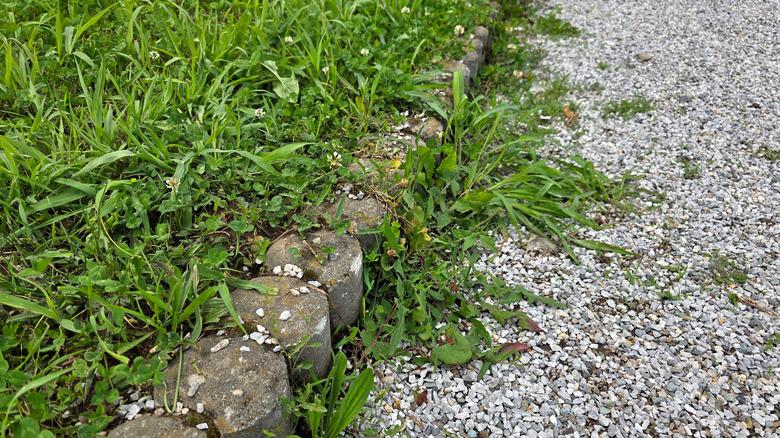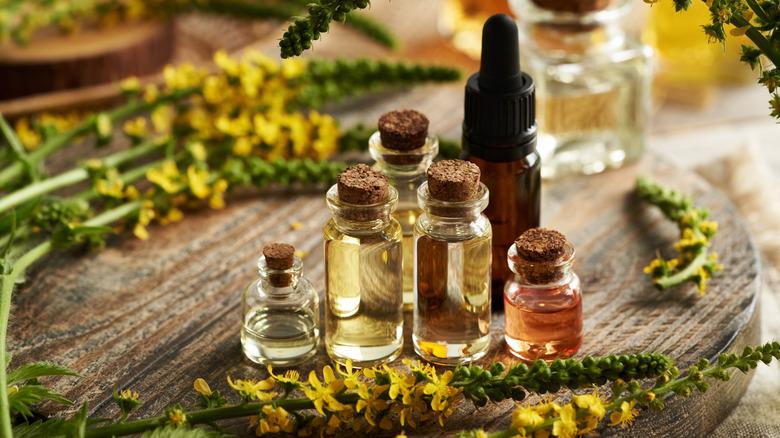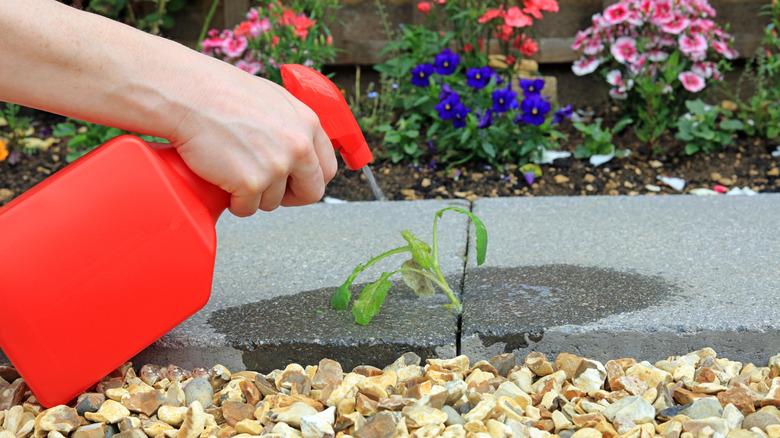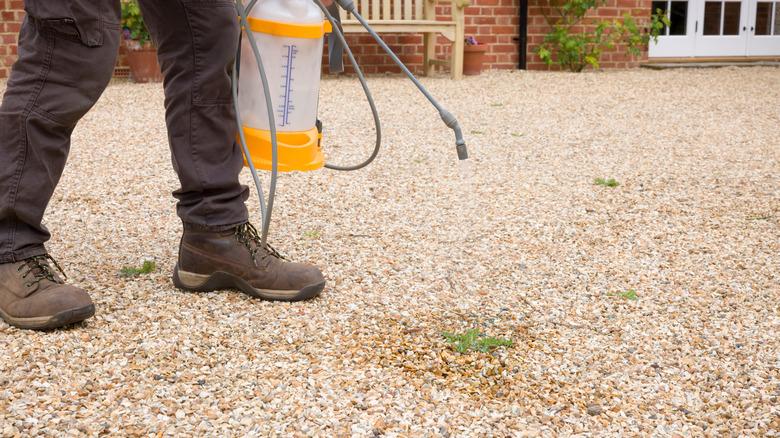Knock Out Weeds Growing In Gravel With The Help Of These Essential Oils
Weeding a garden is hard enough; weeding gravel is doubly difficult. It's often hard to dig through the gravel to pull out roots. Pulling out the roots mixes dirt into your gravel, reducing its aesthetic appeal. Disturbing your gravel also leaves it less compacted and more susceptible to being washed away in the next rainstorm. Fortunately, there's no need to reach for chemical herbicides to solve your weed problem. Essential oils have proven to be highly effective weed suppressants. Three of them in particular — clove oil, cinnamon oil, and thyme oil — are at the top of the list.
There are limits to what essential oils can do. They are especially effective on smaller, immature plants (moreso than on fully grown weeds, so if you've neglected your gravel path too long and have a larger problem on your hand, it may be that the best way to get rid of your weeds is to get on your hands and knees and pull them out one by one). Crawling around on a gravel pathway or driveway can be painful, so get some knee pads or a kneeling pad. Once you've pulled out the larger weeds, you can spray newly emerged weeds with your essential oil spray.
How essential oils compare to chemical herbicides
Essential oils are typically very safe, as they're usually extracts from plants (some are even edible). The oils break down naturally and are consistent with the principles of organic gardening. In scientific studies, clove oil, cinnamon oil, and thyme oil have been proven effective against broadleaf weeds in general, and in particular against common purslane, burning nettle, crabgrass, goose grass, and morning glory. All three oils proved as effective as glyphosate in controlling weeds, and in some cases did so more rapidly.
Chemical weed killers often contain triclopyr, which has been found by researchers in the journal Environmental Toxicology and Chemistry to be toxic against frogs, sunfish, and trout. Clinical Toxicology has also reported that ingestion, accidental or intentional, of triclopyr can be life-threatening in humans. Studies from the Archives of Toxicology and Toxicology in Vitro of another frequently used synthetic weed killer, 2,4-dichlorophenoxyacetic acid (or 2,4-D), have described it as a possible mechanism for male infertility and genetic damage in mammals. And the controversial glyphosate (Round-Up) has shown a "compelling link" to a 41% increased risk for non-Hodgkin's lymphoma in a study in the journal Mutation Research. If possible, it's far safer to use manual removal or to favor essential oils over chemical weed killers.
How to use essential oils to kill weeds
To make your weed killer, mix 10 to 20 drops of essential oil with a tablespoon of dish soap and water to fill a spray bottle, preferably a dark glass bottle to help retain the potency. Shake well, then spray directly on weeds. Essential oils can be purchased from grocery stores or herbal centers in highly concentrated form. Just remember that, undiluted, they can be toxic to pets and children if ingested, especially in large amounts. They can also be skin and eye irritants, so it's best to wear gloves and eye protection when preparing your weed killer potion.
There are also ways to prevent weeds from emerging from gravel in the first place. According to the journal Weed Technology, a combination of clove and cinnamon oil may provide up to 69% weed suppression. Using essential oils in combination with each other can increase their efficacy for these purposes.
When to call a professional for weed killing
Essential oils aren't perfect, but no herbicide is. For example, Weed Technology's study showed that clove oil proved effective for controlling broadleaf weeds, but was less effective at some grass species. It was 90% effective at controlling burning nettle at a lower concentration, whereas a higher concentration was needed to control common purslane. And as one can imagine, it also helps to catch weeds early: Less mature weeds are more easily controlled than more established weeds.
There may be times when essential oils are not enough. They are usually non-selective, meaning they may not discriminate between plants you want to grow and those you don't, so use your weed killer carefully around garden beds or lawns. It would also be a mistake when trying to kill weeds to assume that essential oils are a long-term solution to killing weeds. Essential oils volatilize quickly, so their effectiveness is not long-lasting. They are better at killing weeds on contact than at preventing their emergence from seeds or roots hiding deep in the soil. You may need to call a professional to install a weed block underneath your gravel for a longer-lasting solution. Even then, even professionals have yet to outsmart weeds, so it's best to remember that weed prevention is an ongoing activity. Keep your spray bottle handy.



